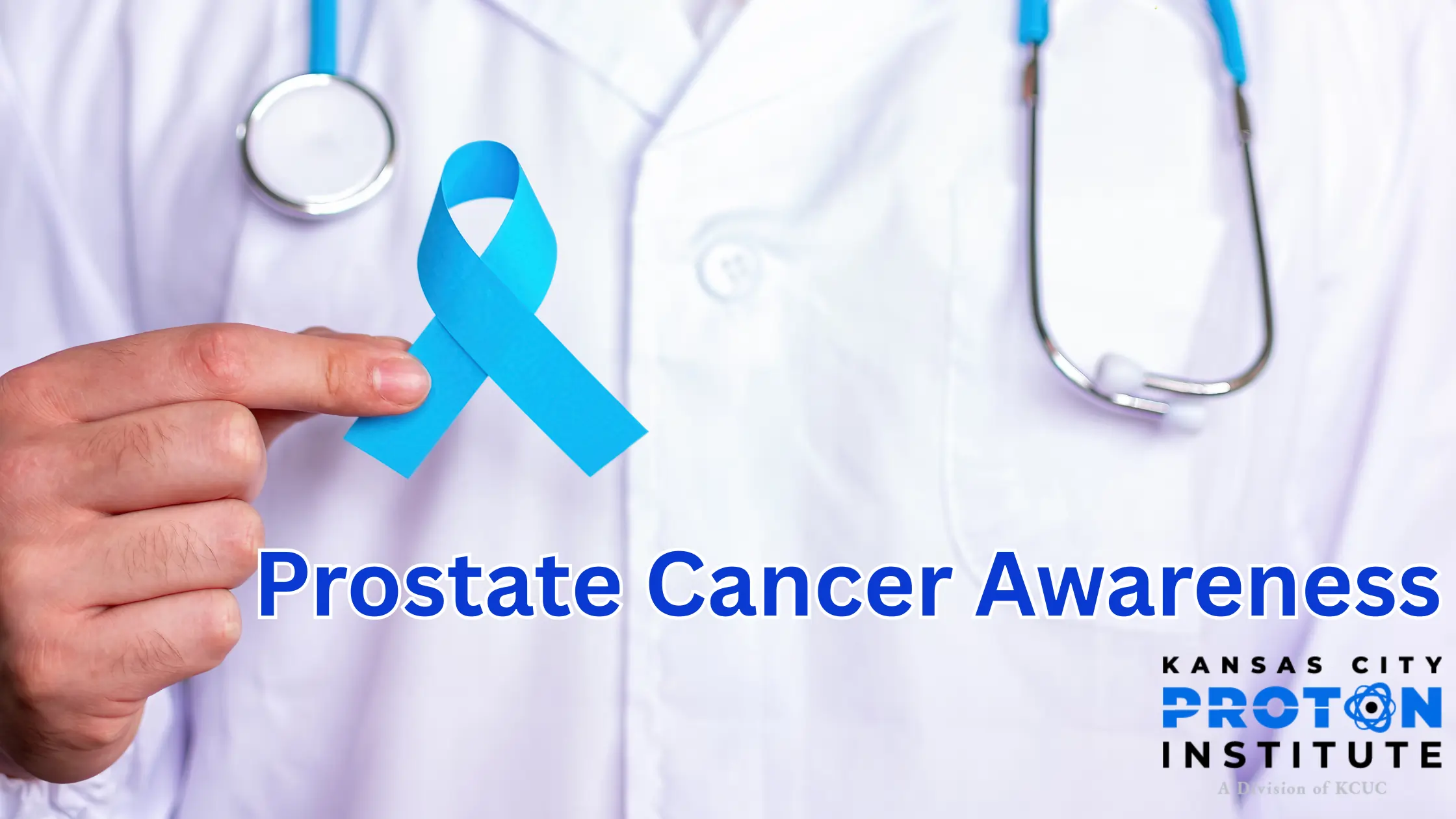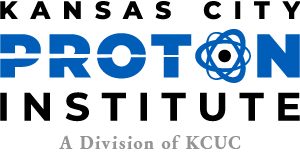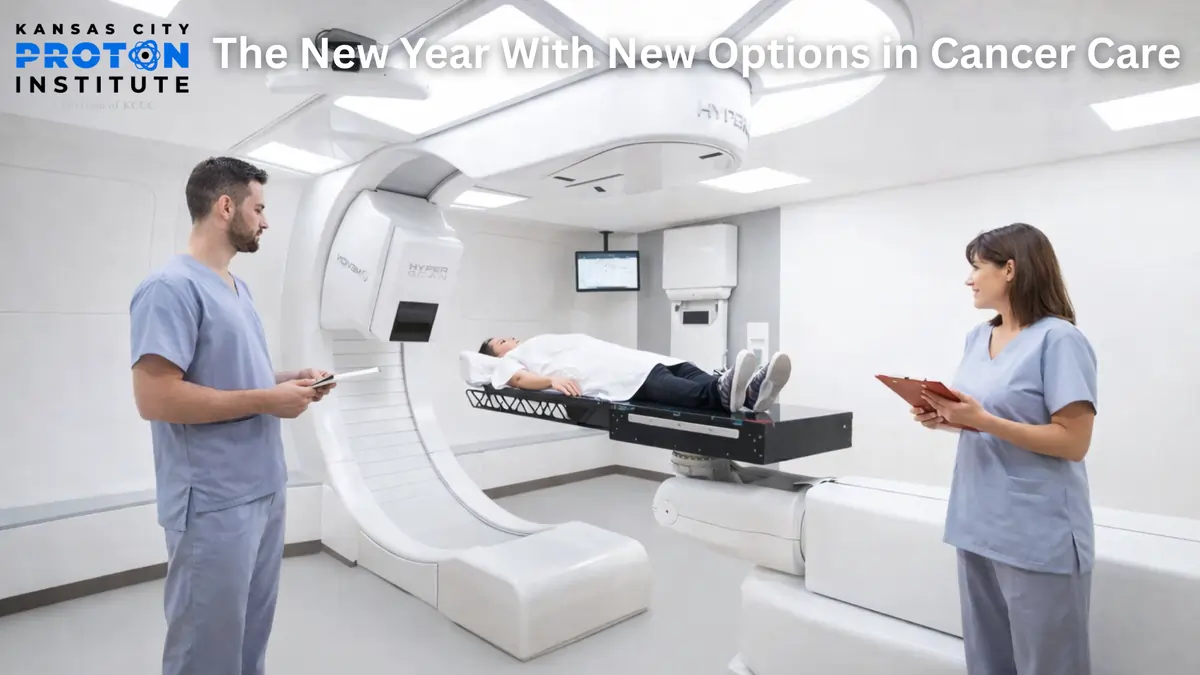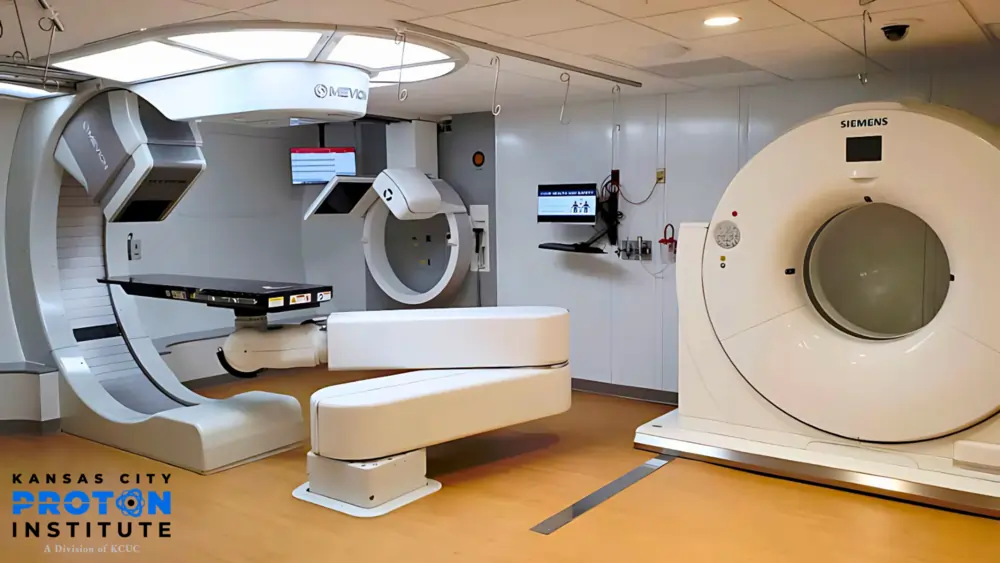
Take Control of Your Health: Prostate Cancer Awareness Month
September is officially Prostate Cancer Awareness Month, a time dedicated to raising awareness, encouraging open conversation, and empowering men to take a proactive approach to their health. While it may seem like just another awareness campaign, prostate cancer is the second most common cancer in American men, with over 313,780 new cases expected to be diagnosed this year alone. It is a disease that affects a diverse range of individuals, and understanding your personal risk factors is the first and most critical step in early detection and prevention.
The Kansas City Proton Institute (KCPI) believes that knowledge is power; early detection is key to successful treatment and achieving the best possible outcomes. By moving beyond the statistics and focusing on what you can do today, you can take control of your health and give yourself, and your loved ones, a sense of security for the future.
Key Risk Factors for Prostate Cancer
Prostate cancer affects men of all backgrounds, but certain factors can significantly increase your risk. Awareness of these factors is crucial for men in the Kansas City area, as well as across the nation.
Age
The primary risk factor for prostate cancer is age. The risk of developing the disease increases significantly after age 50. In fact, more than 60% of all prostate cancer cases are diagnosed in men aged 65 or older. While younger men can be diagnosed, it is far less common.
Family History
Genetics play a powerful role in cancer risk. If you have a father or brother who was diagnosed with prostate cancer, your risk more than doubles. The risk increases even more if the family member was diagnosed at a young age (under 65) or if multiple relatives are affected. It’s also important to note that a family history of other cancers, particularly breast and ovarian cancer linked to BRCA1 or BRCA2 gene mutations, can also increase a man’s prostate cancer risk.
Race/Ethnicity
In the United States, there are significant disparities in prostate cancer diagnoses and mortality. According to the American Cancer Society, African American men have a prostate cancer incidence rate that is about 70% higher than that of Caucasian men. Furthermore, African American men are more than twice as likely to die from the disease. While the reasons for this disparity are complex, they are thought to be a combination of genetic factors and socioeconomic issues, including unequal access to care and differences in diet and lifestyle. Men of Scandinavian descent also have a higher risk, while Asian American and Hispanic/Latino men have a lower risk compared to white men. Understanding these statistics is not meant to cause alarm but to reinforce the importance of proactive screening for men in all communities.
Other Prostate Cancer Risk Factors
Other risk factors include diet, with a high consumption of red meat and high-fat dairy products potentially increasing risk. Obesity and smoking are also linked to an increased risk of aggressive prostate cancer.
What Are Your Prostate Cancer Screening Options?
Prostate cancer often has no symptoms in its early stages, which is why early detection through regular screening is so vital. When caught early, prostate cancer has a near 100% survival rate. The two main screening tests are the Prostate-Specific Antigen (PSA) test and the Digital Rectal Exam (DRE).
PSA Test: The PSA test is a simple blood test that measures the level of prostate-specific antigen, a protein produced by prostate cells. Elevated levels of PSA can indicate the presence of cancer, but they can also be caused by other non-cancerous conditions like benign prostatic hyperplasia (BPH) or prostatitis. Your doctor will interpret your PSA level in the context of your age, family history, and other factors.
Digital Rectal Exam (DRE): During a DRE, a doctor uses a gloved, lubricated finger to feel the prostate gland through the rectal wall to check for any lumps, hard spots, or other abnormalities. While it may be uncomfortable, it is a quick and valuable part of a comprehensive screening.
The conversation about when to begin screening is a personal one that should be had with your urologist or primary care physician. General guidelines from organizations like the American Cancer Society recommend that:
- Men at average risk begin the discussion with their doctor at age 50.
- Men at high risk (including African American men or those with a family history) begin the discussion at age 45.
- Men at even higher risk (with multiple affected first-degree relatives) begin at age 40.
Ultimately, your doctor will help you decide on the right screening schedule for you based on your personal risk profile. For men in the Kansas City metro area, consulting with a men’s health urology specialist or oncologist is the first step toward creating a personalized health plan. Contact KCPI today to learn more about your treatment options!
The Benefits of Proton Therapy with KCPI
Compared to traditional x-ray (photon) radiation therapy, proton therapy has a number of benefits, including:
- The pencil-thin beam of protons targets tumors and cancer cells with precision.
- Reduced risk of damage to surrounding healthy tissues and organs.
- Proven effective in across age groups.
- Fewer side effects vs. x-ray (photon) radiation therapy in most cases.
- Reduced likelihood of secondary tumors caused by treatment.
- Painlessly delivers radiation through the skin.
- Allows for a higher radiation dose to the tumor.
Should a screening indicate the need for further action, there is a wide range of treatment options available, and the field is constantly evolving. In the past, treatments like traditional radiation therapy or surgery carried a significant risk of side effects, including incontinence and erectile dysfunction. Today, advanced technologies like proton beam therapy are offering new hope with reduced side effects.
As a leading oncology center for prostate cancer treatment in Overland Park, KS, The Kansas City Proton Institute (KCPI) specializes in proton beam radiation therapy, which delivers a highly targeted and precise dose of radiation to the tumor while sparing surrounding healthy tissue. This is especially critical for prostate cancer, as the prostate is located near sensitive organs like the bladder and rectum. By minimizing damage to these nearby structures, proton therapy significantly reduces the risk of side effects, helping men maintain their quality of life. Schedule an appointment with KCPI today!
Beyond Awareness: Taking Action Together
Prostate Cancer Awareness Month is more than just a campaign; it’s a call to action. It’s an opportunity to have an honest conversation with your doctor, talk with your family about health history, and encourage the men in your life to prioritize their well-being. By getting screened, you can catch this disease early, when it is most treatable.
In the spirit of community and action, we want to remind you that your participation matters. As the month of September closes, the journey continues. October brings the annual ZERO Prostate Cancer Run/Walk, here in Kansas City, sponsored by KCUC. Zero Prostate Cancer Run/Walk is an event dedicated to raising awareness and funds to end prostate cancer. It is a powerful way to show your support, honor those who have fought the disease, and contribute to the ongoing search for a cure.
Don’t wait. Take control of your health today. If you have questions about your risk, screening options, or proton therapy, the team of experts at KCPI is here to help: Schedule an appointment with one of our specialists today!




